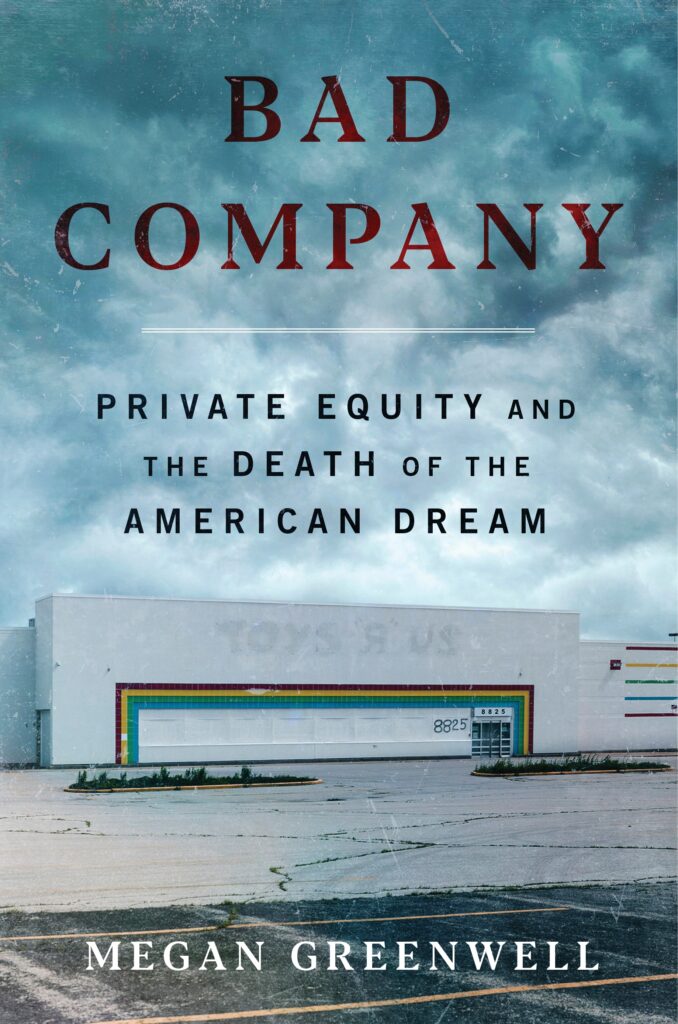Three Questions About…Private Equity
In her new book, author Megan Greenwell humanizes the horrors of a secretive industry
By Nona Willis Aronowitz
When journalist Megan Greenwell scored her dream job as the editor-in-chief of the sports website Deadspin, she hadn’t thought about private equity at all. She had never done any finance reporting, and she had only the vaguest sense of what private equity even did. But when, in 2019, Deadspin was being destroyed by the firm that owned it, she wrote a scorched-earth resignation letter and resolved to learn more about the human cost of this ubiquitous and insidious industry. Her resulting book, Bad Company: Private Equity and the Death of the American Dream, tells the story of four people whose lives were upended by private equity–and how they all fought back.
John Oliver once said, “If you want to do something evil, put it inside something boring.” Your book is not boring, but I think for many of us, our eyes glaze over at financial terms we don’t know. How do you explain private equity to get laypeople to care?
The only way I wanted to write this book was if it was for people who have some sense that private equity is important and has negative consequences, but have zero idea what that means. Here’s how I describe it: The engine of the private equity machine is leveraged buyouts, which are when a private equity firm pools money from outside investors–pension funds, university endowments, ultra-wealthy individuals, what have you–and combines that money with a huge amount of bank loans, then uses that combined fund to buy companies.
The trick is that the debt from the loans is assigned not to the private equity firm but to the company it is acquiring. That’s the detail I think gets people scandalized. They take companies that are pretty strong in a lot of cases and turn them into companies absolutely hamstrung by debt payments, and as a result, 10 times as many companies owned by private equity declare bankruptcy than other kinds of companies. The private equity firms themselves don’t take on any risk, but this has horrible effects on communities, workers, tenants, patients, everybody.

The book’s subtitle mentions “the death of the American dream.” How did this theme play out in your reporting? (Also, I have to ask: Was it just a coincidence that three out of four of your protagonists were women, or do you think there’s a throughline there?)
I picked the industries first, and I landed on media, healthcare, retail, and housing. Private equity didn’t cause the root problems in these industries; instead, they capitalized on those problems for their own gain. Once I had my protagonists, the interviews drove the American Dream theme rather than the other way around. One is a Mexican immigrant who moved here in middle school, not speaking a word of English, and who managed to become a professional journalist. Another grew up poor in Texas, and his version of the American dream was becoming a community doctor who provided care to his neighbors. Another was a woman who escaped public housing (and a lot of other things), so for her, living in her apartment complex really was the Dream. And the last woman is an Alaska native who moved to the mainland and supported a family of five on a Toys “R” Us retail salary so her husband could go to pharmacy school and make a better life for all of them. In each case, private equity ended up tearing down the things that were most important to these people.
[And about the three-out-of-four women factor,] it’s not surprising to me that women were the majority of people I ended up talking to–not just [of] the four, but the 150 to 200 people I spoke with before I found my protagonists. In part, it’s because there are specific vulnerabilities of being a woman in 21st century America [like poverty] but also because I chose people who were fighting back, and women seem to be more involved in these community fights.
Yes–all of your subjects actively resist their circumstances to varying degrees after private equity shatters their lives. What can someone whose job or industry is being eviscerated by private equity learn from the people in your book?
The four characters in my book all fight back in very different ways. Some put pressure on elected representatives [to regulate private equity]–although there are limitations to that at the federal level, because fully 88% of members of Congress and the Senate take private equity donations. Another character does some lobbying in front of pension funds to get them to stop investing in private equity firms that hurt workers. There’s some true grassroots community organizing to build something new. Some of the most interesting reporting I did was in the media section, where the focus is on people who are trying to create a new nonprofit system. Is that at a big enough scale now that it is fully replacing private equity-owned corporate media? No. But some startup nonprofit local news sites are doing really, really well economically and are becoming amazing sources of news in places that didn’t have news. I think about Mississippi Today, which did not exist until a few years ago, but which won a Pulitzer by exposing a massive scandal in the governor’s office involving Brett Favre. That’s genuinely inspiring to me.